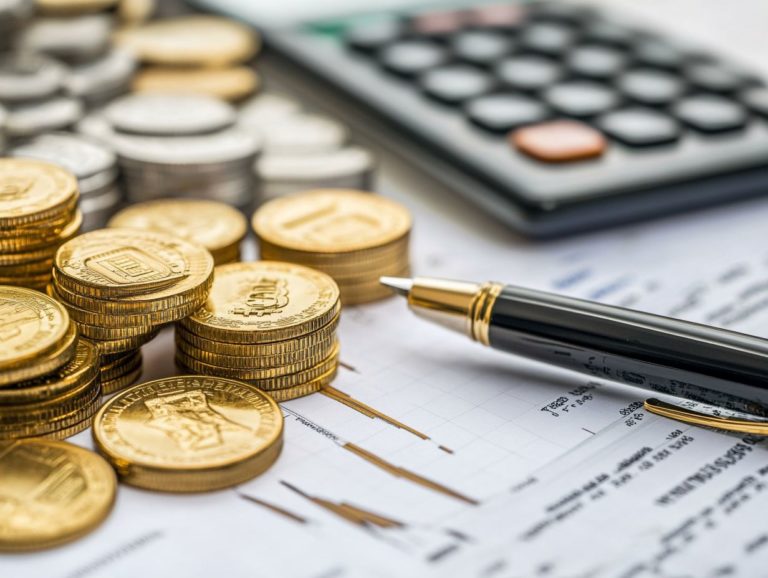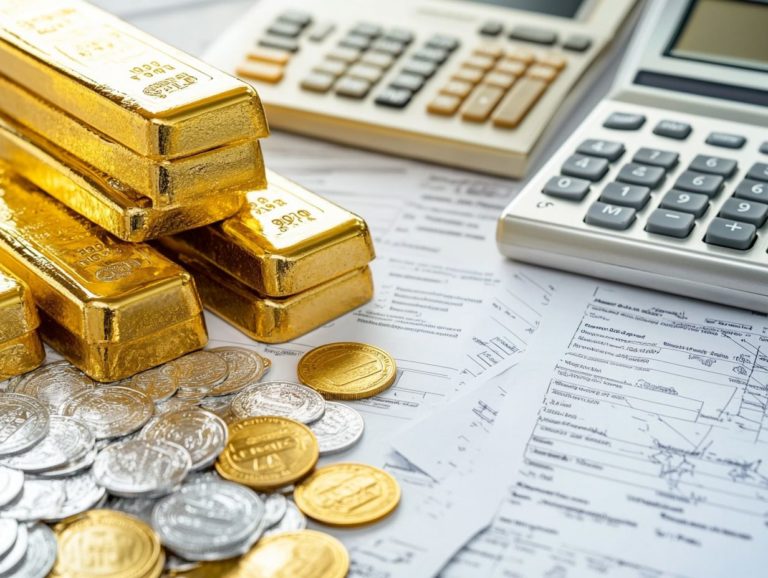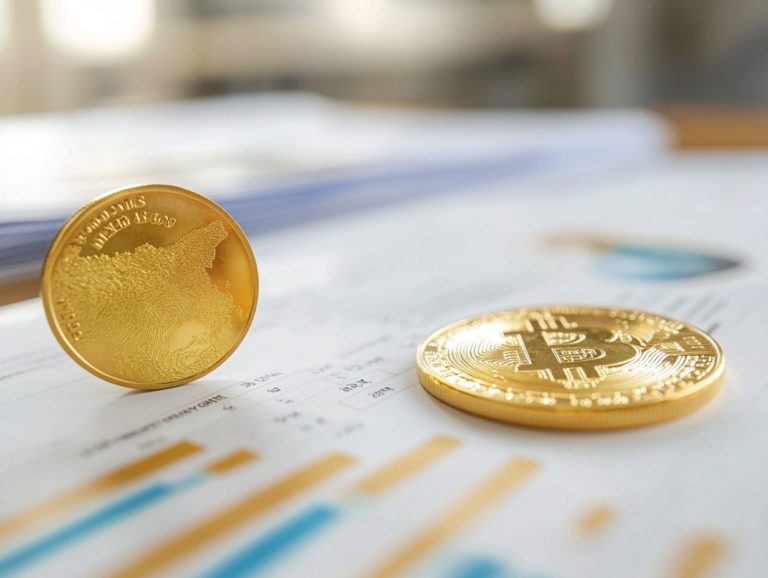Tax Regulations for Precious Metals in Retirement Accounts
Investing in precious metals can be a savvy strategy for diversifying your retirement portfolio. However, understanding the tax rules associated with these investments can feel overwhelming.
This guide provides crucial insights into precious metals, highlighting the types of retirement accounts that accommodate them and the tax benefits and implications of buying or selling.
You will find tips to maximize your tax benefits. Whether you re a seasoned investor or just beginning your journey, this information will empower you to make informed and strategic decisions.
Contents
- Key Takeaways:
- Tax Regulations for Precious Metals in Retirement Accounts
- Guidelines for Investing in Precious Metals in Retirement Accounts
- Tips for Maximizing Tax Benefits with Precious Metals
- Frequently Asked Questions
- What are the tax regulations for holding precious metals in retirement accounts?
- Are there any tax advantages to holding precious metals in a retirement account?
- What types of precious metals can be held in a retirement account?
- Are there any penalties for holding precious metals in a retirement account?
- Do I have to pay taxes on my precious metals when I retire?
- What is the best way to ensure compliance with tax regulations for precious metals in retirement accounts?
Key Takeaways:

- Precious metals, such as gold and silver, can be included in certain retirement accounts for tax advantages.
- When selling or withdrawing precious metals from a retirement account, taxes may apply depending on the account type and holding period.
- To maximize tax benefits, it is important to understand the rules and restrictions for investing in precious metals in retirement accounts and employ tax-efficient investing strategies.
What are Precious Metals?
Precious metals are rare, naturally occurring metallic elements that carry significant economic value, with gold, silver, and palladium leading the pack. These metals are often regarded as safe-haven investments, especially during economic downturns.
Their intrinsic value makes them a top choice for long-term investment and a smart way to diversify retirement funds. As an investor, you might consider these metals as a hedge against inflation and currency fluctuations.
Unlike fiat currencies, which can lose value due to shifting monetary policies, precious metals tend to hold their worth over time, offering a reliable store of value. The demand for gold, in particular, remains strong in both jewelry manufacturing and industrial applications, which helps keep its prices stable.
By integrating these metals into your diversified portfolio, you can enhance its resilience against market dynamics. They often move inversely to stock markets, allowing you to mitigate risk and safeguard your wealth, even in challenging economic climates.
Types of Retirement Accounts that Allow Precious Metals
Several types of retirement accounts allow you to invest in precious metals, including the Individual Retirement Account (IRA), precious metal IRA, and self-directed IRA. Each of these accounts must comply with IRS regulations, providing a tax-efficient shelter for your retirement funds.
A traditional IRA allows for tax-deferred growth, while a Roth IRA offers the benefit of tax-free withdrawals during retirement. Precious metal IRAs specifically focus on holding eligible metals, such as bullion and coins that meet IRS standards for purity and type.
With a self-directed IRA, you manage your investments directly, granting you greater flexibility in selecting your assets. Understanding IRS regulations like those governing allowable metals and contribution limits is essential for maximizing your tax advantages and ensuring compliance.
Tax Regulations for Precious Metals in Retirement Accounts
The IRS dictates tax regulations for precious metals in retirement accounts, requiring your careful adherence to specific guidelines to steer clear of tax penalties.
As an investor, you must navigate a complex web of rules to ensure your precious metals serve as a tax-efficient haven within your individual retirement accounts.
Have you considered how precious metals can enhance your portfolio? Start exploring your precious metal investment options today!
Tax Advantages of Investing in Precious Metals

Investing in precious metals through a precious metal IRA provides you with tax advantages. This approach allows your retirement funds to grow in a tax-efficient shelter, enabling long-term investment without immediate tax liabilities.
It s an appealing option for anyone looking to secure their financial future. By leveraging these tax benefits, you can boost your retirement savings and potentially accumulate greater wealth over time.
For example, any gains from the appreciation of precious metals in these accounts aren t taxed until distribution. This gives you the opportunity to reinvest those gains and enhance your overall portfolio.
Transactions within these accounts typically do not trigger tax consequences, offering a substantial advantage for those who adopt smart investing methods. Adhering to rules from the IRS (the tax authority) ensures compliance and maximizes the financial security this investment vehicle provides. This allows you to balance risk while safeguarding your wealth against market fluctuations.
Tax Implications of Selling or Withdrawing Precious Metals
sSelling or withdrawing precious metals from your retirement accounts can carry significant tax implications, including potential tax penalties if IRS regulations governing these transactions aren’t followed meticulously. Understanding these implications is essential for effectively managing your investment risk.
If you decide to liquidate precious metals held in a self-directed IRA, failing to execute the sale through a qualified custodian could lead to immediate taxation on the full value of your withdrawal.
If you choose to take the metals out as physical assets rather than cash, you might trigger penalties under specific regulations, especially if you’re under the age of 59 .
Imagine withdrawing gold coins from your retirement account for a personal transaction. In that scenario, you’d not only face ordinary income tax on the value, but you’d also incur a 10% early withdrawal penalty, which could severely disrupt your financial strategy.
Guidelines for Investing in Precious Metals in Retirement Accounts
Investing in precious metals within your retirement accounts entails adhering to specific guidelines crafted to safeguard your retirement funds and ensure compliance with IRS regulations.
By grasping these guidelines, you can effectively mitigate the risks that come with investment volatility while maximizing the benefits of your retirement portfolio.
Rules and Restrictions
The rules and restrictions surrounding your investment in precious metals through a precious metal IRA are primarily governed by IRS regulations. These regulations require you to use a segregated account and a secure storage facility for holding physical precious metals.
You must ensure that only specific types of metals, such as gold, silver, platinum, and palladium, which meet strict purity standards, are included in your account.
Compliance with IRS regulations is essential; failing to adhere to these guidelines could lead to significant tax penalties and even disqualify your IRA.
Choose reputable custodians. They manage your accounts and help with buying, selling, and storing these valuable assets. Look for secure storage facilities that are insured and compliant with all necessary safety regulations. This provides you with peace of mind as you safeguard your wealth.
Tips for Maximizing Tax Benefits with Precious Metals

Maximizing tax benefits with precious metals in your retirement accounts requires adopting strategies that are aligned with tax-efficient investing principles and mindful of contribution limits and risk minimization.
By implementing these strategies, you can significantly enhance the overall performance of your retirement funds. Act now to make your investments work harder for you!
Strategies for Tax-Efficient Investing
Implementing strategies for tax-efficient investing in precious metals means leveraging a precious metal IRA as a savvy tax shelter. This approach helps you reduce exposure to investment volatility and promotes long-term investment growth.
By utilizing this method, you can shelter your gains from immediate taxation, enhancing your overall investment returns. Another effective strategy is investing in bullion coins or bars. These options offer liquidity and are often favored for lower capital gains tax rates compared to collectible items.
Diversifying within the metals market by including silver and platinum alongside gold can further stabilize your portfolio. When you adopt a long-term perspective, you mitigate the impact of market fluctuations and benefit from the historical appreciation of these tangible assets, ensuring a robust hedge against inflation.
Frequently Asked Questions
What are the tax regulations for holding precious metals in retirement accounts?
The tax regulations for holding precious metals in retirement accounts vary depending on the account type and the metal itself. Generally, precious metals in a Traditional IRA or 401(k) follow the same tax rules as other investments. In contrast, a Roth IRA may have different implications.
Are there any tax advantages to holding precious metals in a retirement account?

Yes! Holding precious metals in a retirement account offers tax advantages. For instance, in a Traditional IRA, you may defer taxes on any gains until withdrawal, allowing for tax-free growth. Holding precious metals in a Roth IRA allows for tax-free gains upon withdrawal!
What types of precious metals can be held in a retirement account?
The types of precious metals that can be held in a retirement account depend on the specific account and custodian. Generally, most retirement accounts allow holding gold, silver, platinum, and palladium in bullion or coin form.
Are there any penalties for holding precious metals in a retirement account?
There are no penalties for holding precious metals in a retirement account, provided they comply with the Internal Revenue Service (IRS) guidelines. However, withdrawing funds from a retirement account before age 59 may incur an early withdrawal penalty.
Do I have to pay taxes on my precious metals when I retire?
The tax regulations for precious metals in retirement accounts apply to fund distributions. When you retire and withdraw funds, taxes may be applicable, depending on the account type and precious metal.
What is the best way to ensure compliance with tax regulations for precious metals in retirement accounts?
The best way to ensure compliance with tax regulations is to work with a reputable and experienced custodian specializing in precious metals. They can help you navigate complex tax rules and keep your retirement account compliant with IRS guidelines.
Ready to maximize your investment returns? Consult with a financial advisor or consider investing in precious metals today!














